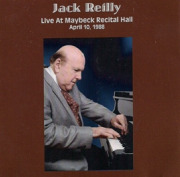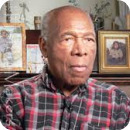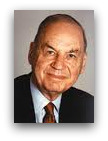Doug Ramsey's Blog, page 15
September 26, 2010
Weekend Extra: Joan Stiles
The pianist, composer and teacher Joan Stiles runs one of the hippest sextets in New York. Her circle of insider admirers encompasses many of the best-known musicians in [image error]jazz today and is widening to include a substantial number of listeners in the general audience. Stiles achieves identifiable individuality in her own compositions and in her arrangements of songbook standards and pieces by Mary Lou Williams, Thelonious Monk, Fats Waller, Jimmy Rowles and Duke Ellington, among others.
Stiles was the most recent guest on Marian McPartland's Piano Jazz on National Public Radio, with Jon Weber subbing for McPartland. She plays several unaccompanied pieces, including her impressions of Monk on "Spherical," and a few with Weber on bass. NPR streams the program on the web at this address. Go there and click on "Listen Now."
Stiles' sextet is truly all-star: Jeremy Pelt, trumpet; Steve Wilson, alto saxophone; Joel Frahm, tenor saxophone; Ben Williams, bass; and Lewis Nash, drums. The only videos I've been able to locate of the band are mostly short, made at the Iridium in New York with a static camera that sometimes excludes Stiles and a microphone that could be closer to the piano. Nonetheless, a couple of them will give you the flavor of the band and of Stiles' soloing. The first features Pelt. The second is the title track of her most recent CD, Hurly Burly.
Why that was cut short, I have no idea. "Hurly Burly" in its entirety is on this album. Full disclosure: I wrote the liner notes for it a couple of years ago. And I'd do it again. Stiles is gaining recognition and deserves it.
September 24, 2010
Recent Listening: Jack Reilly At Maybeck
Jack Reilly, Live At Maybeck Recital Hall (Unichrom). Maybeck is a small hall in Berkeley, California, loved by pianists and listeners for the perfection of its acoustics. Carl Jefferson of Concord Records was so taken with the sound of the room that he initiated a series of 42 solo piano recordings there. It began with Joanne Brackeen in 1989 and ended with James Williams in 1995. In between is a variety of the finest pianists in jazz, among them Dick Hyman, Jaki Byard, Ellis Larkins, Jessica Williams, Hank Jones and George Cables. After pianist Dick Whittington bought Maybeck, but before Concord discovered it, Jack Reilly was one of the first artists who played there, so he is not included in the series. That is a pity, because Reilly's Maybeck concert equals the best of the Concord Maybeck albums.
All is not lost, however. Reilly recently discovered that his 1988 concert existed on a cassette tape. He concluded that it was some of his best playing and decided to release  it on Unichrom, his private label. The transfer to CD may not bring the sound up to 2010 digital perfection, but it is entirely listenable. The slight sandpaperiness around the audio edges does nothing to obscure Reilly's virtuosity and creativity. Into a program of jazz and classical pieces he pumps energy, imagination andin some casesswing that is almost physically palpable. His program encompasses Cesar Franck, Chopin, Ravel, Strayhorn, Ellington, Gershwin, Bill Evans and two of his own compositions. His opening piece is the Franck "Prelude, Chorale and Fugue," performed with subtlety, power and fidelity to the composer.
it on Unichrom, his private label. The transfer to CD may not bring the sound up to 2010 digital perfection, but it is entirely listenable. The slight sandpaperiness around the audio edges does nothing to obscure Reilly's virtuosity and creativity. Into a program of jazz and classical pieces he pumps energy, imagination andin some casesswing that is almost physically palpable. His program encompasses Cesar Franck, Chopin, Ravel, Strayhorn, Ellington, Gershwin, Bill Evans and two of his own compositions. His opening piece is the Franck "Prelude, Chorale and Fugue," performed with subtlety, power and fidelity to the composer.
Reilly introduces jazz to the concert when he melds Chopin's C-major Prelude with "Take the 'A' Train" and the Chopin G-minor Prelude with "It Don't Mean a Thing if it Ain't Got That Swing." The commonality he finds in Chopin and Strayhorn, Chopin and Ellington, corroborates Ellington's famous dictum that there are only two kinds of musicgood music and the other kind. Reilly makes a medley of a Ravel minuet and three Evans pieces, incorporating stride passages into "Waltz for Debby" and giving "Peri's Scope" harmonic complexity that enhances the joy of his presentation. "November" is a fast ¾ modal piece that swirls, rumbles and blusters like the month that gave it its name.
Reilly introduces some of the usual suspects into the lineup of his Gershwin medley, invigorating "Someone to Watch Over Me" and "My Man's Gone Now" with tempo and harmonic shifts, and ending with an "I Got Rhythm" that summarizes his pianism and musicianship. It has blindingly fast tremolos and runs worthy of Tatum, the left hand rampant on a field of stride, sophisticated chord substitutions in shifting harmonies and a free flurry at the top of the keyboard that might make Cecil Taylor raise an eyebrow.
Throughout the concert, Reilly goes through chordal hoops and dazzling time shifts while giving the listener melody to hold onto; a neat trick. He is an original.
September 22, 2010
A Bill Evans Addendum
Thanks to Jan Stevens of The Bill Evans Web Pages for pointing the way to a revealing interview with Evans the year before he died. Ross Porter (pictured), then of the Canadian Broadcasting Corporation, talked[image error] with the pianist at his home and in his car as Evans was driving to a medical appointment. Evans is articulate about his career, his musical goals and his associates, including Miles Davis, Philly Joe Jones and Scott LaFaro. He does not dwell on his fateful habits, nor does he evade the subject. His tough-minded devotion to his music is apparent. Porter, one of the most skilled and knowledgeable jazz broadcasters, integrates a few of Evans' recordings into the program. Since his CBC days, Porter has been president of Jazz.FM91 in Toronto. To hear his conversation with Bill Evans, go here, check the last little box on the right and press Play.
September 21, 2010
Buddy Collette, 1921-2010
Buddy Collette, a master of reeds and woodwinds who played a major part in integrating Los Angeles studios and the musicians union, is gone. He died on Sunday at the age of  89. Like his contemporary Angelenos Charles Mingus and Dexter Gordon, Collette was an important part of the southern California jazz community long before the invention of the term West Coast Jazz. He played important roles in bands led by Benny Carter, Gerald Wilson, Chico Hamilton and Conte Candoli, among many others. He assembled a Charles Mingus big band that made a memorable impact at the Monterey Jazz Festival in 1964 and in succeeding years did the same for Dizzy Gillespie and Gil Evans. From Don Heckman's obituary of Collette in today's Los Angeles Times:
89. Like his contemporary Angelenos Charles Mingus and Dexter Gordon, Collette was an important part of the southern California jazz community long before the invention of the term West Coast Jazz. He played important roles in bands led by Benny Carter, Gerald Wilson, Chico Hamilton and Conte Candoli, among many others. He assembled a Charles Mingus big band that made a memorable impact at the Monterey Jazz Festival in 1964 and in succeeding years did the same for Dizzy Gillespie and Gil Evans. From Don Heckman's obituary of Collette in today's Los Angeles Times:
Collette's virtuosic skills on saxophones, flute and clarinet allowed him to move easily from studio work in films, television and recording to small jazz groups and big bands. He was, in addition, one of the activists instrumental in the 1953 merging of the then all-African American musicians union Local 767 and the all-white Local 47.
To read the complete obituary, go here.
Here is Collette playing unaccompanied alto saxophone.
September 19, 2010
Sudhalter Plays Beiderbecke
Richard M. Sudhalter died two years ago today. A superb writer and musician, he was the author of the definitive biography of Bix Beiderbecke and played cornetbeautifullyin the Bix tradition. Here he is with the New York Jazz Repertory Company at a Town Hall concert in the early 1970s, playing Beiderbecke's "Davenport Blues." With him are Kenny Davern, bass saxophone; Bob Wilber, clarinet; Ephie Resnick, trombone; Marty Grosz, banjo; Chauncy Morehouse, drums; and Dill Jones, piano. The cornetist to Dick's left, paying close attention, is young Warren Vaché, Jr.
For an archive piece posted here when Dick Sudhalter died, and comments about him from Rifftides readers, go here.
Correspondence: On Discovering Bill Evans
Many of the numerous comments about my Bill Evans article in The Wall Street Journal this week have been touching. None has been more moving or more extensive than this one from Rifftides reader Mark Mohr. The staff agreed that Mr. Mohr's account of discovering Evans should be an item of its own because it parallels the experiences of so many other listeners.
I first saw Bill Evans in concert at the University of California at Santa Barbara in 1974. He and his trio (Eddie Gomez and Marty Morrell) were touring in support in the newly-released Fantasy album Since We Met. I was a fledgling disc jockey at the campus radio station, KCSB-FM. The station had made a serious commitment to extensive jazz programming, and I was just beginning to experience and enjoy jazz. There were quite a few students at the radio station who said a Bill Evans concert was not to be missed. I didn't know anything about Evans at the time but the station had received a few promo records and I seriously listened to Since We Met to find out what all the buzz was about. From the first note of the concert until[image error] the to the audience applause at the end, I was spellbound and struck by the quality of the music. Tender, sad, introspective and wonderful. I attended the Evans' concert at the university's Campbell Hall with some friends from the radio station. We had good seats and sat close to the stage. Evans, Morrell and Gomez walked out in matching slacks, dress shirts and sport coats. (It was the style at the time.) For the next forty-five minutes, the music and the musicians mesmerized me. I had never heard anything like it and I was hooked. At intermission, the radio boys and I went backstage and I nervously introduced myself to Bill and the other members of the trio. He was polite and friendly, but somewhat shy. The second half of the concert was even better than the first, if that's possible. Afterwards, the band left for their next gig in whatever town was next on their touring schedule.
The audience filed out and I went back to the radio station and replayed the album, listening even more closely. The next day, I found a few more Evans records in the station's library, and began to enjoy his earlier recordings. I told my parents about my extraordinary discovery and they wound up seeing him in concert a few weeks later at the Hollywood Bowl. I only saw him perform live once more, at the Catamaran Hotel in San Diego. It was four years later but by then, I had developed quite a collection of his records and later on I began collecting his CD's. His music always struck me as very, very special but I could never quite understand how such a talented musician and such a special man had fallen victim to drug use and abuse. This week marked the 30th anniversary of his passing. I've spent the past few days listening to a lot of his music, but I still think my all time favorite is Since We Met. My parents were deeply touched by his music, too. After they died, I spread their ashes into the Pacific Ocean at sunset and played some of their favorite Bill Evans music: "Seascape," "Dolphin Dance," "Peau Deuce" and fittingly, "I Will Say Goodbye." Bill Evans may be gone, but his music will live forever.
September 17, 2010
Other Matters: Edwin Newman, 1919-2010
Edwin Newman's death at age 91 is not the end of an era. The broadcast news era that produced Newman ended long ago, as you may have noticed in most of the news programs you watch on television and, particularly, on cable. Newman worked for NBC News. He was of a generation of broadcast news people the best of whom applied the values of the wire services and newspapers where they learned the craft of journalism.  He was a splendid reporter who functioned as one of NBC's most productive, versatile and wise correspondents. He anchored newscasts, delivered commentaries and wrote and hosted documentaries. In his radio and television broadcasts, Newman often devoted segments to defending the correct use of the language and to witty, if unyielding, criticism of its butchery by those who should know better. He was disturbed by what he saw as the deterioration of the average American's ability to be articulate. He delighted in telling about the man he once interviewed whose answer to a question was, "Well, y'know, you never know, y'know?"
He was a splendid reporter who functioned as one of NBC's most productive, versatile and wise correspondents. He anchored newscasts, delivered commentaries and wrote and hosted documentaries. In his radio and television broadcasts, Newman often devoted segments to defending the correct use of the language and to witty, if unyielding, criticism of its butchery by those who should know better. He was disturbed by what he saw as the deterioration of the average American's ability to be articulate. He delighted in telling about the man he once interviewed whose answer to a question was, "Well, y'know, you never know, y'know?"
A few video clips exist of Ed Newman at work. YouTube has a series of pieces from the documentary he did about the 1964 World's Fair in New York and a few audio segments of his interviews with Marshall McLuhan about language. I thought about showing you one of those lighter pieces, but decided to instead use the commentary Newman delivered on the day in 1963 when President Kennedy was assassinated. The elegance of his language and the clarity of his thought are as vivid and pertinent now as they were 47 years ago.
Edwin Newman, RIP
Listening Tip Corrected: Ingrid Jensen, Benny Green
A dyslexia attack a week ago caused the Rifftides proprietor to alert readers to a radio broadcast last Sunday that, in fact, will take place this coming Sunday, September 19. The only way to make amends is to correct the mistake and post the item again. The entire Rifftides staff is on vacation this week, more or less, but this may give the impression that we're on the job.
On his Jazz Northwest program this weekend, Jim Wilke will be playing the Ingrid Jensen-Benny Green concert that he recorded at the Port Townsend Festival in July. The trumpeter and the pianist appeared with drummer Jon Wikan, Dawn Clement on Fender Rhodes piano and bassist David Wong. According to Wilke's alert to the broadcast, the band "brought the near capacity crowd to its feet at the end of the concert." Photo by Jim Levitt
Photo by Jim Levitt
I wasn't at Port Townsend this year, but the audience reaction Jim describes is no surprise. Three years ago, at The Seasons in Yakima, Washington, I heard what I think was Jensen's and Green's first joint appearance. This is some of what I posted shortly after.
When I arrived home after a post-concert hang late Saturday night, I found this message from a musician friend:Has there ever been a better concert at the Seasons than the Ingrid Jensen one this evening?No. I have attended most of the jazz and classical events at The Seasons in its nearly two years of operation. I have heard wonderful performances in that former church, with its dramatic domed space and nearly perfect acoustics, but none better than when Jensen, the gifted Canadian trumpeter, and pianist Benny Green got together in a one-off collaboration. Creative sparks flew.
And
It is impossible to analyze with accuracy what is responsible for a performance that rises above even the usual excellence of artists of the quality of Jensen, Green, Jon Wikan and Russ Botten. I have a notion that what fired it up in this instance was the depth and unusual makeup of Green's accompanying chords in the first piece, and the way he applied them rhythmically. The harmonic changes in his comping stimulated Jensen to daring ideas that she incorporated in long, flowing melodic lines through the entire concert. The range and virtuosity of her trumpet and flugelhorn playing are givens. What I am emphasizing is the lyric and melodic content of her improvisations.
To read all of the July, 2007, Rifftides review, go here.
I have no idea whether their 2010 encounter reached those heights, but I wouldn't miss the opportunity to find out. Jazz Northwest will air at 1 o'clock PDT Sunday afternoon, September 19, on KPLU-FM (88.5) in the Seattle Tacoma area. For internet listeners, it will stream live on the station's website. Click on "Listen Now."
September 15, 2010
Compatible Quotes: Bill Evans
First of all, I never strive for identity. That's something that just has happened automatically as a result, I think, of just putting things together, tearing things apart and putting it together my own way, and somehow I guess the individual comes through eventually.
Especially, I want my work - and the trios if possible - to sing.
It bugs me when people try to analyze jazz as an intellectual theorem. It's not. It's feeling.
Doug Ramsey's Blog
- Doug Ramsey's profile
- 2 followers



